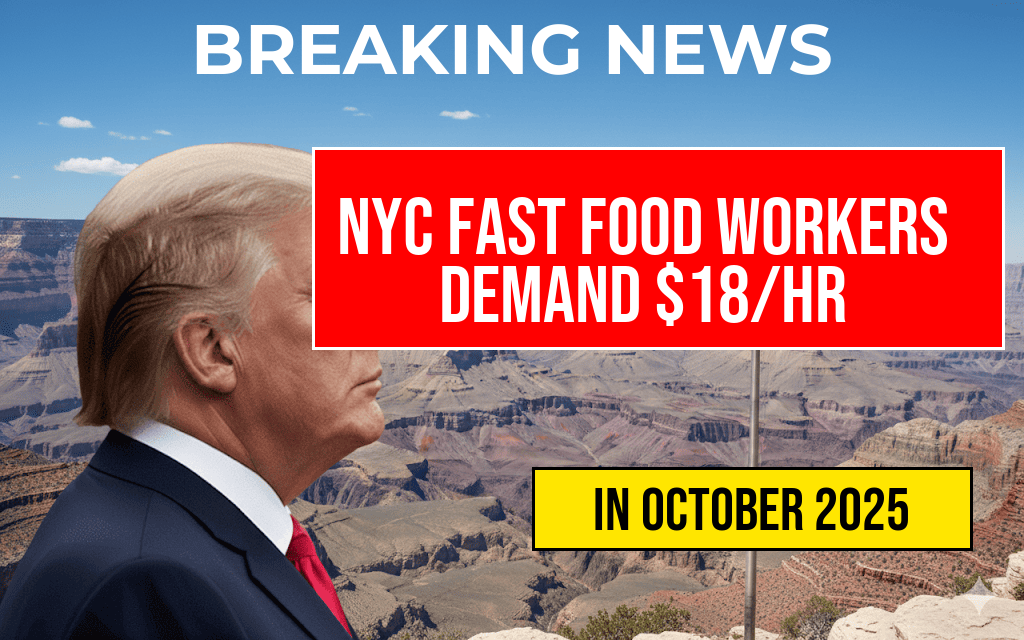Fast food workers across New York City are escalating efforts to secure an $18 an hour minimum wage, citing the rising cost of living and demanding fair compensation for their labor. The campaign, which has gained momentum over recent months, involves organized protests, petitions, and negotiations with local policymakers. Advocates argue that current wages fall short of meeting basic living expenses in a city known for its high housing costs and inflationary pressures, prompting calls for urgent policy adjustments. The movement underscores broader discussions about wage standards within the service industry, highlighting disparities between fast food workers and other sectors. As city officials grapple with balancing economic recovery and worker rights, this push for higher wages signifies a critical moment in the ongoing debate over fair pay in New York’s bustling culinary landscape.
Background of the Campaign
The push for a higher minimum wage among NYC fast food employees originates from a coalition of labor unions, grassroots organizations, and worker advocates. These groups argue that the current minimum wage, which is $15 an hour in New York State, is insufficient for workers to cover basic needs, especially in a city where rent, transportation, and groceries have surged in recent years. The campaign has been fueled by a series of strikes and protests targeting major fast food chains, with participants demanding a wage increase that aligns more closely with the cost of living.
Economic Context and Rising Cost of Living
According to recent data from the U.S. Census Bureau and the New York City Department of Housing Preservation and Development, the average rent for a one-bedroom apartment in NYC exceeds $2,800 per month. Coupled with rising grocery prices and transportation costs, many fast food workers find their wages stretched thin. The cost of living in NYC remains among the highest in the country, making a wage increase essential for workers to maintain stability.
Worker Demands and Organizing Efforts
Organizers have outlined specific demands, including:
- Implementing an $18 an hour minimum wage for fast food employees in NYC.
- Improved safety protocols and protective measures amid ongoing health concerns.
- Recognition of worker rights to unionize without retaliation.
These efforts are supported by data indicating that an $18 hourly wage would significantly improve workers’ quality of life, enabling them to afford housing, healthcare, and other essentials. The campaigns include coordinated rallies outside fast food outlets, social media outreach, and lobbying efforts aimed at city council members and state legislators.
Industry Response and Business Impact
Some fast food chains have publicly acknowledged the need to address wage concerns but caution against sudden increases that could impact their operational viability. A spokesperson for a major chain stated, “We are committed to fair wages and working conditions, but any changes must be balanced with economic realities.” Smaller franchise owners express concern that a mandatory $18 minimum could lead to increased menu prices or job cuts, potentially affecting their competitiveness. However, worker advocates argue that fair wages are essential for retaining staff and reducing turnover, which has been a persistent challenge in the industry.
Policy and Political Landscape
City officials have shown cautious support for wage increases, with some council members endorsing the campaign’s goals. A recent proposal in the NYC Council suggests exploring a phased approach to raise wages incrementally, while advocates push for a more immediate implementation. State legislators are also under pressure to consider legislation that would set a higher minimum wage specifically for fast food workers, similar to recent efforts in other states like California and Massachusetts.
Broader Implications and Future Outlook
The successful push for an $18 minimum wage could set a precedent for other sectors within NYC and beyond. Labor experts suggest that such a move might influence wage standards nationally, especially amid ongoing discussions about economic inequality and worker rights. However, opponents warn of potential unintended consequences, such as increased automation or reduced employment opportunities, which could impact vulnerable workers in the long term.
Key Stakeholders at a Glance
| Stakeholder | Position |
|---|---|
| Fast Food Workers | Advocate for $18/hour minimum wage, better working conditions |
| Fast Food Chains | Concerned about operational costs, cautious about rapid wage hikes |
| City Officials | Supporting fair wages, exploring phased implementation |
| State Legislators | Potentially open to legislation for sector-specific wage increases |
| Consumer Groups | Generally supportive, emphasizing fair pay for essential workers |
As the campaign continues to gain momentum, the debate over fair wages in New York City underscores the persistent tension between economic growth and workers’ rights. The outcome of these efforts may influence future labor policies across the country, shaping the landscape of minimum wage standards in the service industry. For more on NYC wage policies and labor movements, visit Wikipedia’s wage labor page or Forbes’ coverage on labor issues.
Frequently Asked Questions
What is the main goal of the New York fast food workers’ campaign?
The primary goal of the campaign is to achieve a minimum wage of $18 an hour for fast food workers in New York City.
Why are fast food workers advocating for higher wages?
Fast food workers are advocating for higher wages to improve their financial stability, ensure fair compensation for their work, and address the living cost challenges in NYC.
How might a $18 minimum wage impact fast food workers and the industry?
Implementing a $18 minimum wage could lead to increased income for workers, better working conditions, and potentially influence pricing and industry standards in NYC’s fast food sector.
Are there any specific campaigns or actions currently taking place in NYC?
Yes, fast food workers are organizing strikes, protests, and advocacy campaigns to pressure policymakers and fast food companies to raise the wage.
What are the challenges faced by fast food workers in their fight for a higher minimum wage?
Challenges include opposition from industry stakeholders, economic concerns, and the need for policy changes to legally mandate the increased wage.

Leave a Reply